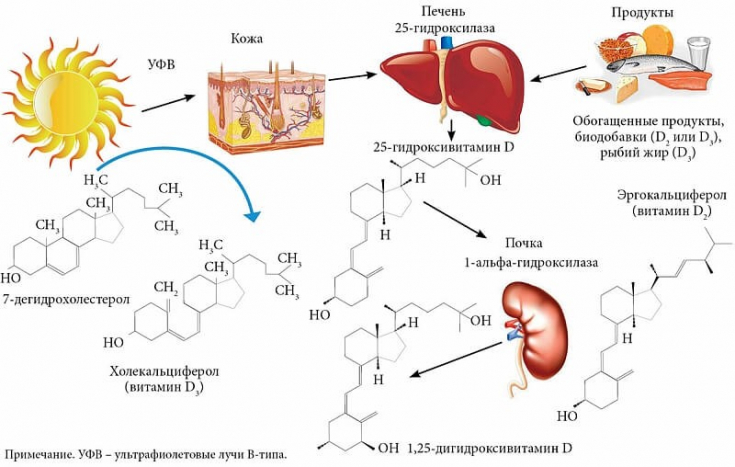For a long time, the main function of vitamin D was considered to be the maintenance of calcium and phosphorus homeostasis, but now vitamin D is considered a prohormone and the range of its studied functions has greatly expanded. The American Society of Endocrinologists recommends that vitamin D deficiency be defined as serum levels of 25(OH)D <20 ng/mL (50 nmol/L). It dose-dependently affects the differentiation and proliferation, apoptosis of skin cells, thereby participating in the pathogenesis of dermatological diseases.
- The role of vitamin D in the processes of skin physiology
- Psoriasis and vitamin D deficiency
- How does vitamin D affect the development and course of atopic dermatitis
The role of vitamin D in skin physiology
The skin is the source of vitamin D in the body. Keratinocytes synthesize it from 7-dehydrocholesterol, which is a precursor of vitamin D. Keratinocytes are also targets for the biologically active form of the vitamin, calcitriol.
Follow our Instagram!
At low concentrations, vitamin D enhances proliferation of keratinocytes, while at high concentrations it inhibits, stimulating differentiation. In physiological concentration, the vitamin prevents apoptosis caused by UV radiation, a tumor necrosis factor. At the same time, in high concentration it is able to stimulate apoptosis of keratinocytes.

Vitamin D has an effect on the barrier function of the skin. It strengthens the epidermal barrier, by stimulating the synthesis of structural proteins and glycosylceramides, which are necessary for the formation of the lipid protective layer.
Read also: The ABC of the skin for a cosmetologist (Part 1): the structure of the epidermis
Local immunity of the skin is carried out with the help of physical barrier structures, immune cells and antimicrobial peptides. Antimicrobial peptides - ?-defensins and cathelicidins - destroy the bacterial cell membrane, the virus envelope, stimulate the proliferation of keratinocytes and their migration to the area of violation of the integrity of the skin for healing.
Vitamin D regulates the synthesis of those same antimicrobial peptides by regulating the activity of serine proteases that destroy them.
In addition, the active form of the vitamin directly affects undifferentiated and inactivated T-helpers, T-regulators, activated T-cells.
Vitamin D has a photoprotective effect on skin cells, reducing DNA damage, reducing keratinocyte apoptosis.
Psoriasis and vitamin D deficiency
According to numerous studies, in patients with psoriasis in the blood revealed deficiency or insufficient level of vitamin D.
There is a relationship between the degree of the course of the disease and the concentration of the vitamin in the blood serum: with vitamin deficiency, a more severe course of psoriasis is noted.
Vitamin D is able to reduce the severity of psoriasis symptoms by reducing the infiltration of psoriatic foci by T-lymphocytes, slowing down the influence of pro-inflammatory cytokines (IL-12, IL-23, IL-1α, IL -1β, FNT), which are contained in excessive amounts in the area of psoriatic skin lesions.
Read also: Psoriasis of the scalp: diagnosis and treatment
Vitamin D inhibits the action of chemoattractants, psoriasin and coebnerisin, which increase inflammation of psoriatic areas.

In addition to anti-inflammatory action, in patients with psoriasis, the vitamin can act on the affected epidermis, affecting the expression of genes that are hereditary risk factors for psoriasis.
According to some studies, skin lesions in psoriasis and a violation of its functions may well be the cause of inadequate synthesis of vitamin D. In this case, a vicious circle is formed: psoriatic skin lesions, increased proliferation and impaired differentiation of keratinocytes, which will lead to a decrease in the synthesis of vitamin D, which, in turn, will worsen the course of the disease.
How does vitamin D affect the development and course of atopic dermatitis
There is a clear association between vitamin D deficiency and deficiency and increased risk of developing atopic dermatitis. The severity of the disease is inversely correlated with vitamin D deficiency.
According to studies, patients with atopic dermatitis had lower vitamin D levels than controls.
Read also: Atopic Dermatitis Skin Care
Vitamin D is able to positively influence the pathogenesis and course of the disease, thanks to the normalization of the level of pro-inflammatory cytokines (ІL‑2, ІL‑4, ІL‑6, IFN‑γ), reduction of IgE secretion, restoration of epidermal barrier, activation of the synthesis of antimicrobial peptides, as well as preventing the activation of mast cells.
Follow us on Facebook!
The beneficial effect of phototherapy in atopic dermatitis and psoriasis can also be explained by correcting vitamin D levels.
Calcitriol regulates the proliferation, differentiation and apoptosis of keratinocytes, affects the barrier function of the skin and local immunity. Understanding and utilizing the anti-inflammatory and immunosuppressive activities of vitamin D will help guide the treatment of skin conditions more clearly and effectively. Vitamin D deficiency can be safely considered a potential risk factor, and possibly a pathogenetic link in the development of allergic and chronic inflammatory dermatoses.
More interesting stuff on our YouTube channel:







Add a comment